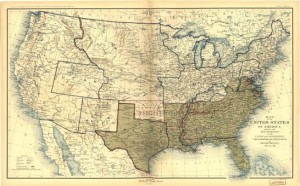 Today is Easter Sunday, a religious holiday not recognized by Baptists, who oppose Easter as a worldly holiday with pagan origins. Services in Baptist churches proceed as usual, while Baptist soldiers writing home (as many do on Sundays) to not reference Easter, whereas many other Christian soldiers do.
Today is Easter Sunday, a religious holiday not recognized by Baptists, who oppose Easter as a worldly holiday with pagan origins. Services in Baptist churches proceed as usual, while Baptist soldiers writing home (as many do on Sundays) to not reference Easter, whereas many other Christian soldiers do.
On this Easter Sunday, the New York Times features a brief blurb about Baptist influence in the West.
I have often heard it questioned at the East whether the moral, religious and educational progress of the West kept pace with its physical and material development. I was looking over a report of a religious society in our youngest State, the other day, and noticed a fact which may have a bearing upon this question. It was the report of the Baptist State Missionary Convention of Minnesota. In 1852 there were in this State two Baptist ministers, three churches, having in all a membership of less than fifty. In 1862 — ten years afterward — there were 104 churches, 89 ordained ministers, and 2,580 members.
The Civil War in short, has not curtailed the growth of Baptists in the United States. As Baptists in the North grow in numbers and influence in the years to come, they slowly embrace Easter as a special day to be recognized. Acceptance in the South comes much slower. Between the early 20th century and mid-20th century, Southern Baptists gradually drop their opposition to Easter and come to view Easter Sunday as an opportunity to pack church pews.
Sources: “Baptists in Minnesota,” New York Times, April 5, 1863 (link); Stephen D. Wilson, “Easter a Worldly Holiday? 100 Years Ago, Southern Baptists Thought it Was,” Baptist Press, April 5, 2012 (link)


